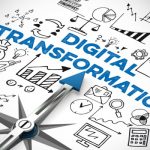Fear of automation is part of the pandemic

We’re nowhere close to being out of the woods just yet, with COVID-19 death rates in the US still averaging around a 1,000 a day, but we're starting to get there at last thanks in part to a robust vaccination program.
However, the after-effects of the pandemic's impact will linger long after the illness subsides. According to new research, a lot of people are losing their jobs as a result of automation.
DDoS attacks intensify in 2020 -- driven in part by COVID-19 and 5G

Cybercriminals had a busy year in 2020, with rapidly increasing numbers of distributed denial of service (DDoS) weapons, widespread botnet activity, and some of the largest DDoS attacks ever recorded. As COVID-19 drove an urgent shift online for everything from education and healthcare, to consumer shopping, to office work, hackers had more targets available than ever -- many of them under protected due to the difficulty of maintaining security best practices in an emergency scenario.
At the same time, the ongoing rollout of 5G technologies has accelerated the proliferation of IoT and smart devices around the world, making unsuspecting new recruits available for botnet armies to launch crushing attacks on a massive scale.
What we can learn from organizations who flourished during COVID?

When the knock-on effects of the coronavirus pandemic and subsequent UK lockdowns are discussed, much of the focus is on the negative impact on the economy, our physical health, and our mental health. But, while the damaging effects are unlike anything we’ve ever witnessed, it’s not all doom and gloom.
While many businesses have suffered as a result of the pandemic, others have flourished. Exercise equipment, homeware, DIY, and gardening retailers, amongst others, were some of the businesses that flourished during the first national lockdown. When it comes to business-to-business, technology providers, ecommerce sites, video conferencing software solutions, and healthcare providers led the way. So did the companies who tapped into their services.
Half a dozen little 2021 predictions about life after COVID-19

Six hundred and seventy-five thousand Americans died of the Spanish Flu in 1918, back when the total population of the United States was 103 million. In the current pandemic, American deaths are already above 540,000 (remember when a projection of 160,000 deaths seemed crazy?) but our population is now 331 million. While COVID-19 will undoubtedly kill more Americans than did the Spanish flu, the percentage of the population dying will be much lower than the 0.65 percent death rate in 1918. But the numbers are close enough that one might guess the long-term impact of this pandemic could be very similar to that one.
I don’t think it will be. I think this pandemic will have greater long-term effects than that of 1918 and the reason comes down mainly to technology.
2021 Prediction #6: COVID-19, Clubhouse, and The Great High School Reset

To this point in my tech predictions for 2021 I have ignored COVID-19, which we all do at our peril. Now that we know the pandemic is real, that it won’t just disappear, and that half a million people in the US (so far) are dead from it, what are predictable longer-term impacts? I see plenty changing in how we work, how we use social media, and how education has generally failed. Coming out the other side of this mess several aspects of life will be different, but school probably won’t be one of those.
I have an unusual perspective on these times since I am a parent of three sons (19, 16, and 14), I have a background in IT, yet my first job out of college 48 years ago was teaching high school biology, chemistry, physics, and vocational agriculture. Oh, and I home-schooled two of my kids for two years ending about 18 months before the pandemic began.
How to onboard new starters in the COVID-era

COVID-19 has completely transformed the way we work. As the rapid spread of the virus forced the UK Government to impose a national lockdown on March 23 2020, businesses across the country were forced overnight to operate remotely. Indeed, many employees have not worked in a traditional office setting for almost one year.
In most cases, workforces have successfully acclimatized to this 'new normal'. Communication platforms such as Zoom and Slack have reigned supreme, ensuring that teams are able to communicate on a daily basis with little hindrance to their performance.
The impact of COVID-19 on modern retailers

There is no doubt that the coronavirus pandemic has changed the landscape of the retail sector. Social distancing regulations and civil anxiety surrounding the virus mean that physical stores do not offer the same browsing experience as we would usually expect. Meanwhile, a growing reliance on online shopping has been boosted by instructions to remain at home as much as possible.
The impact of COVID-19 and our new shopping behaviors have a profound effect on retailers. Changed buying experiences, falling and rising sales, and new consumer demands have defined an adverse year in retail. Here, we look at how customers and businesses have been affected by these changes.
The post-pandemic impact for Service Provider Networks in 2021

The year 2020 was challenging to say the least. Between the pandemic, shutdowns, wildfires and other natural disasters, most of us will look forward to a new beginning in 2021. However, the pandemic response in 2020 will have a lasting impact on how and where consumers and businesses will use networks services, how service providers will build out their networks, and where they will invest in additional capacity.
On that basis, here are a few predictions for 2021 for service providers:
Overcoming COVID-19: What finance leaders at recently-funded tech startups have learned so far

There’s no doubt that 2020 has been a testing year for everyone. According to data from PwC, 53 percent of CFOs expect a decrease in revenue and/or profits of up to 25 percent as a direct result of COVID-19. For many tech startups, that’s the difference between staying alive and closing for good.
With such uncertainty in the air, leadership teams have had to act fast and rethink their entire strategy.
'Pfizer/BioNTech's Covid19 vaccine' for sale on the dark web

COVID-19 has wreaked havoc across the world and infections are showing no signs of slowing. Just yesterday, the USA reported 218,576 new cases and 2,918 new deaths. Thankfully there are a number of promising vaccines, with Pfizer/BioNTech’s the first to be made widely available. The UK is due to start rolling it out next week.
For those desperate for the vaccine an agonizing wait lies ahead -- if they want to go down the official route at least. However, drug dealers on the dark web are already selling 'Pfizer COVID Vaccines'.
How to get a new tech job during a pandemic

Earlier this month, we took a look at how COVID-19 is impacting the technology job market, with a focus on precarious tech positions. In this piece, we want to explore a related question: if you are a tech worker who has recently been laid off or lost your job, which steps can you take right now to stay competitive in a tight job market?
Here are three tips for tech workers seeking jobs who want to set themselves apart from the pack.
Advantages of remote onboarding

The world of work has changed, and remote work is no longer an option or perk. Teams worldwide have been forced to go fully- or mostly-remote, many with a weekend’s notice. As the months of working from home drag on, we’ve had to readjust our processes and systems -- one of which is employee onboarding.
The importance of a strong onboarding program can’t be overstated -- especially since only 12 percent of employees are happy with their organization’s onboarding programs, and 50 percent of new hires leave their organizations within their first 18 months. While remote work is associated with decreased retention, we can’t deny the outsized impact of an employee’s first few months on the rest of their tenure.
COVID-19 has hurt physical book sales and helped audio and digital

You would expect the recent coronavirus crisis to have helped digital entertainment, but with reading it is still led by the traditional hardback and softback formats. However, the pandemic is helping to dethrone physical books, as people are more cautious about going out. While paper books still lead the market, their dominance is shrinking.
Information in a new infographic sheds a lot of light on the current state of our perusal of tomes. For instance, India is the most well-read country in the world, while the US lags in 22nd place.
Delivering value to a remote workforce: A practical approach

The overnight switch to remote working triggered by the COVID-19 pandemic has caused an unprecedented amount of change to the usual ways of working. The impact will continue to be felt for the foreseeable future -- and as a result, IT departments’ approach to delivering services to their organizations will need to keep pace with the evolving requirements of this newly remote staff.
To that end, IT needs to embed itself deeper in the organization to understand the unique requirements of every single stakeholder -- be it the C-suite or the manager answering the customer call -- so that those professionals can do their jobs effectively, enabling the business to realize its strategic goals. In practical terms, what does this mean? How can IT departments put these tactics into practice in their enterprises?
Redefining Security post-pandemic: Empowering change control in the new normal

Amid the COVID-19 pandemic, remote working has added a new dimension to the security, compliance, and digital transformation demand landscape. Now, more than ever, it is increasingly important for organizations to embed security solutions and processes that reduce complexity and massively increase the automation of killer manual tasks.
Last month, our team at New Net Technologies had the opportunity to host a virtual panel on securing digital transformation and what COVID-19 means for cybersecurity as we continue to navigate the growing remote workforce. The panel, which consisted of several security experts, focused on the topic of redefining security in a post-pandemic world. The session kicked off with the question, 'Have you noticed a more compliant workforce?'.
Recent Headlines
Most Commented Stories
BetaNews, your source for breaking tech news, reviews, and in-depth reporting since 1998.
Regional iGaming Content
© 1998-2025 BetaNews, Inc. All Rights Reserved. About Us - Privacy Policy - Cookie Policy - Sitemap.